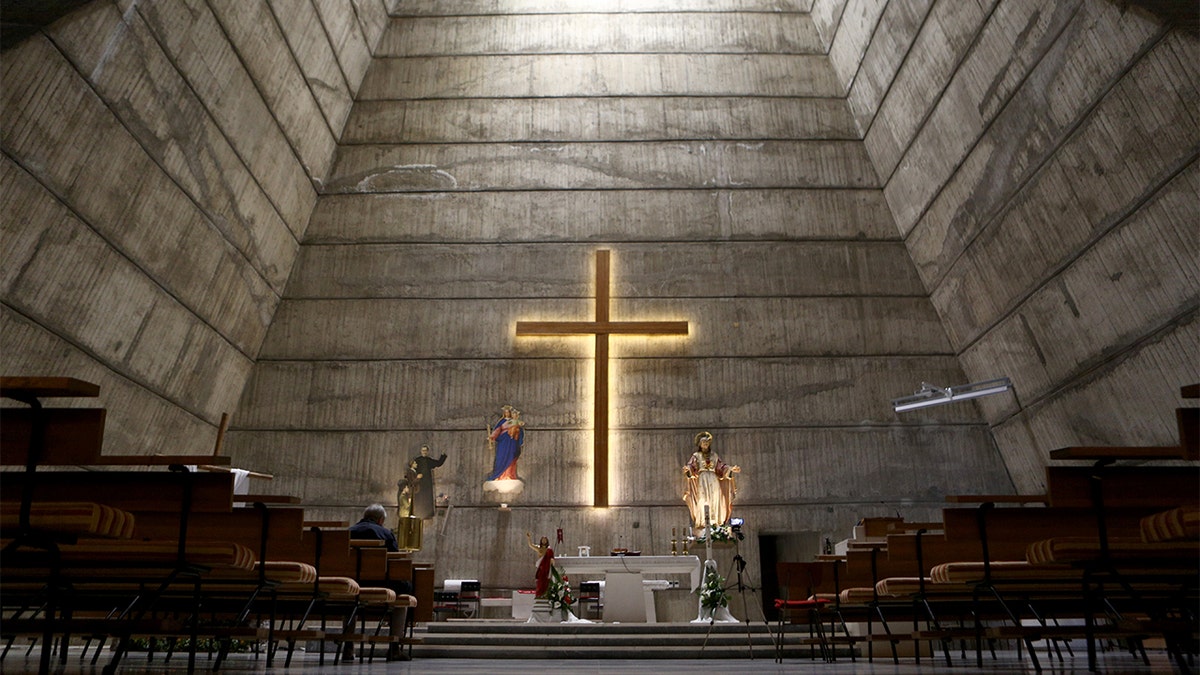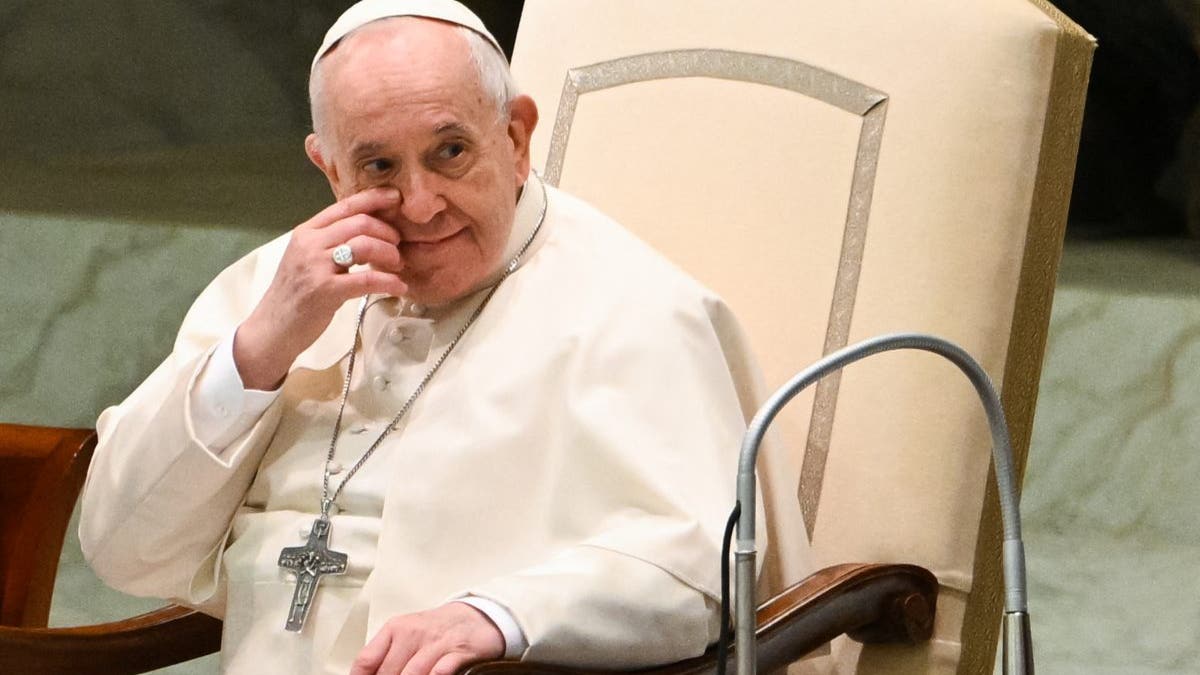What to watch Easter weekend on Fox Nation
Fox Nation host Kacie McDonnell joins ‘Fox & Friends’ to highlight shows and movies featured on Fox Nation for the Easter holiday.
What comes to mind at the thought of Easter? For some, it’s the profound and solemn proposal of Christianity. For others, there is the frivolity of pastels, of bunnies, of jellybeans and eggs. Still others exhibit a cynical skepticism and conclude that, if the commemoration has authentic historical roots, it all amounts to little more than a story about some guy who just had a terrible weekend.
Sometimes colorful and sweet traditions can elucidate the audacious claim of Easter, but not when they dilute and even dismiss it as starkly as would an NPR broadcast on Good Friday.
REV. ROBERT SIRICO: GOD HAS A DOG IN OUR FIGHT

A general view of the empty Church of the Holy Heart of Jesus during Easter Sunday Mass on April 12, 2020, in Podgorica, Montenegro. (Filip Filipovic/Getty Images)
Easter’s claim is audacious to our minds today; it was even more so to those who heard the message that first Easter weekend. Paul, who came to believe later than the rest, upped the ante by boldly claiming if it could be shown that Jesus did not rise from the dead, the whole of the Christian claim collapses in a heap. The claim of a resurrected body of Jesus was more audacious in the first century than it still is today because the body then could have been found—and the jig would have been up. If it were a jig, that is.
Did Jesus’s disciples, whether mendacious or psychological, deceive us all with the story of the resurrection?
If the disciples were inventing the story and thus had control over its contents, why would they have placed—at its foundation—witnesses who in the culture of that time were considered legally unreliable? In all four of the Gospel accounts, the first who encountered the newly risen Christ were woman. And the prime witness, Mary Magdalene, had a questionable past. Yet it is she who brings the news to the incredulous apostles.
Additional accounts speak of the depression and fear the disciples were experiencing following Christ’s brutal Passion, which indicate they were not expecting his survival. These records have the ring of history about them—not fiction. Why would anyone, crafting their own inventive narrative, repeatedly admit their own bewilderment and confusion in their first encounters with someone they knew so well?
This indicates the disciples were experiencing something entirely new and unanticipated. They were obviously not in control of the story; the very clumsiness of how they recounted it reinforces its veracity. Nor do these accounts relate subjective revelations, interior traces, dreams, or mystical experiences. No, this story recount something new happening to them—something occurring in the real world, but pointing beyond it.
One undisputed fact is that Jesus’s tomb was and still is empty. Nowhere in history has anyone claimed to have discovered the remains of Jesus. Yet, if the body were stolen, as both his disciples presumed and his enemies claimed, we still have to ask: why were the burial cloths removed and left in the tomb? Who does that?

Pope Francis reacts during the weekly general audience on April 13, 2022 at Paul-VI hall in The Vatican. (Photo by Andreas SOLARO / AFP) (Photo by ANDREAS SOLARO/AFP via Getty Images)
Let’s be clear: Christianity never says that the evidence of the senses is irrelevant or should be dismissed. Christianity does not call into question what exists; it seeks to give a greater meaning of what exists. We see this all the time in this realm, for instance, when entrepreneurs often discover unnoticed, or overlooked things that already exist. Entrepreneurship is, by its nature, a discovery process.
Christ himself offers sensory evidence to Thomas when he invites him to touch and probe his pierced body. Thomas sees and believes while others who had not seen nor touched could still believe. If that encounter was essentially about a resuscitated corpse, we would not still be talking about it today. The world would not have changed. No, resurrection is more than resuscitation.
Instead, Easter was an event that began in history but is completed in eternity. Something more occurred that yields a whole new understanding—not just of Jesus’s existence, but of ours as well.
This way of looking at the events of two thousand years ago give a more complete and satisfying understanding of the whole of human existence. We are material beings, true—but we are something more. Our physical existence alone does not explain the whole of our capacity to recognize beauty or to aspire to honor and to be humbled by splendor.
The more we probe the mystery of Easter, the more we discover our own. It is said that Christology is anthropology and anthropology is Christology. Because as we study Christ, we uncover the One who reveals us to ourselves.
CLICK HERE TO GET THE OPINION NEWSLETTER
For the unbeliever, Easter represents the greatest hoax ever perpetuated on humankind, with all the historic, institutional, and psychological ramifications that proceed from so great a lie.
For the believer, it means that life on this earth has eternal significance and potential because it tells us of One who unraveled the mystery of death and even infuses meaning into suffering as he shares this new life with us.
CLICK HERE TO GET THE FOX NEWS APP
There truly is no middle ground here, as C.S. Lewis argued. Jesus was either a lunatic, a liar, or the Lord. This is the human trilemma.
Taken separately, these arguments do not constitute scientific proof of Christ’s resurrection. But, when taken together, they provide a more plausible, compelling and complete explanation for the events that occurred—even if the assertion is audacious.











































